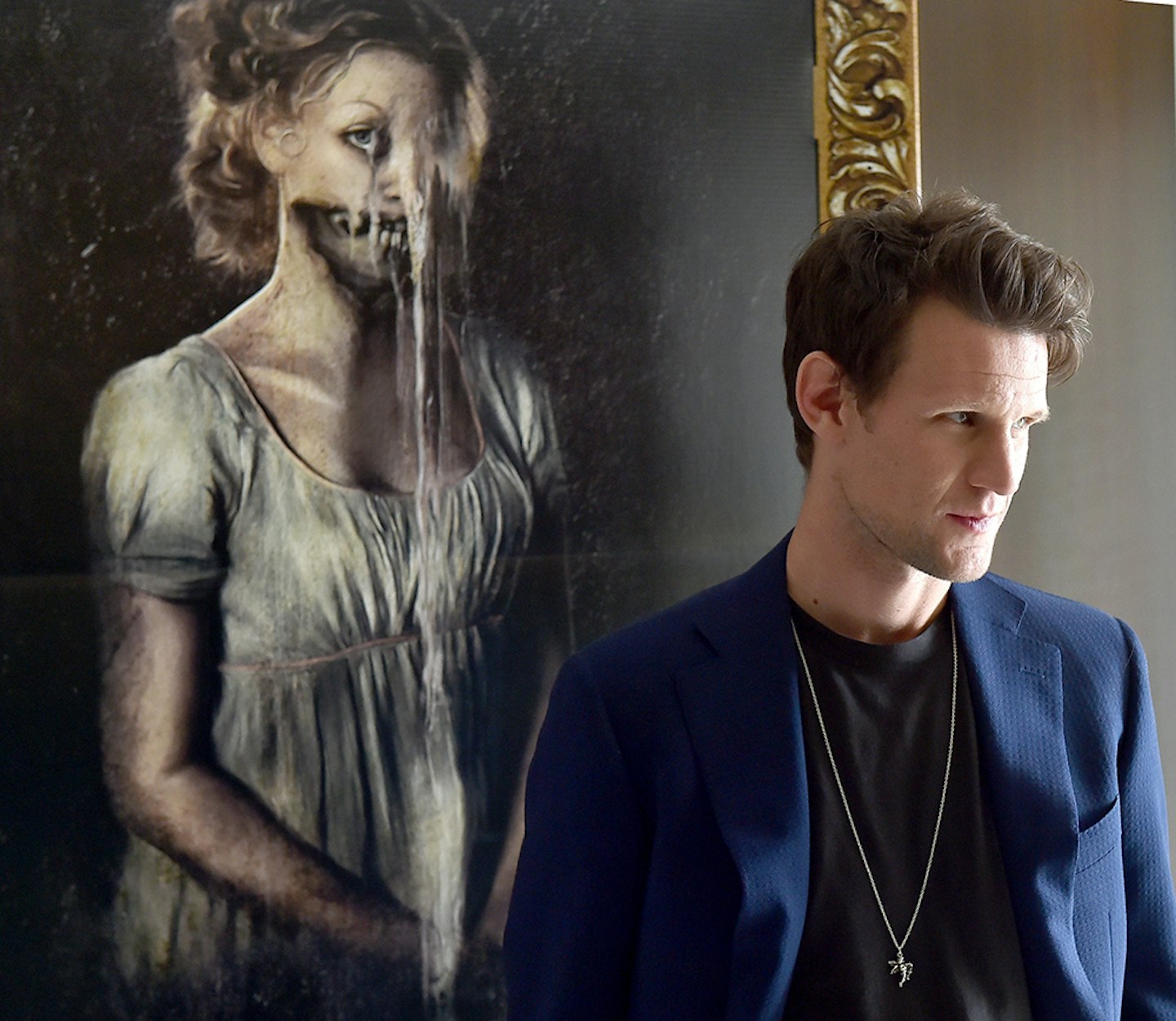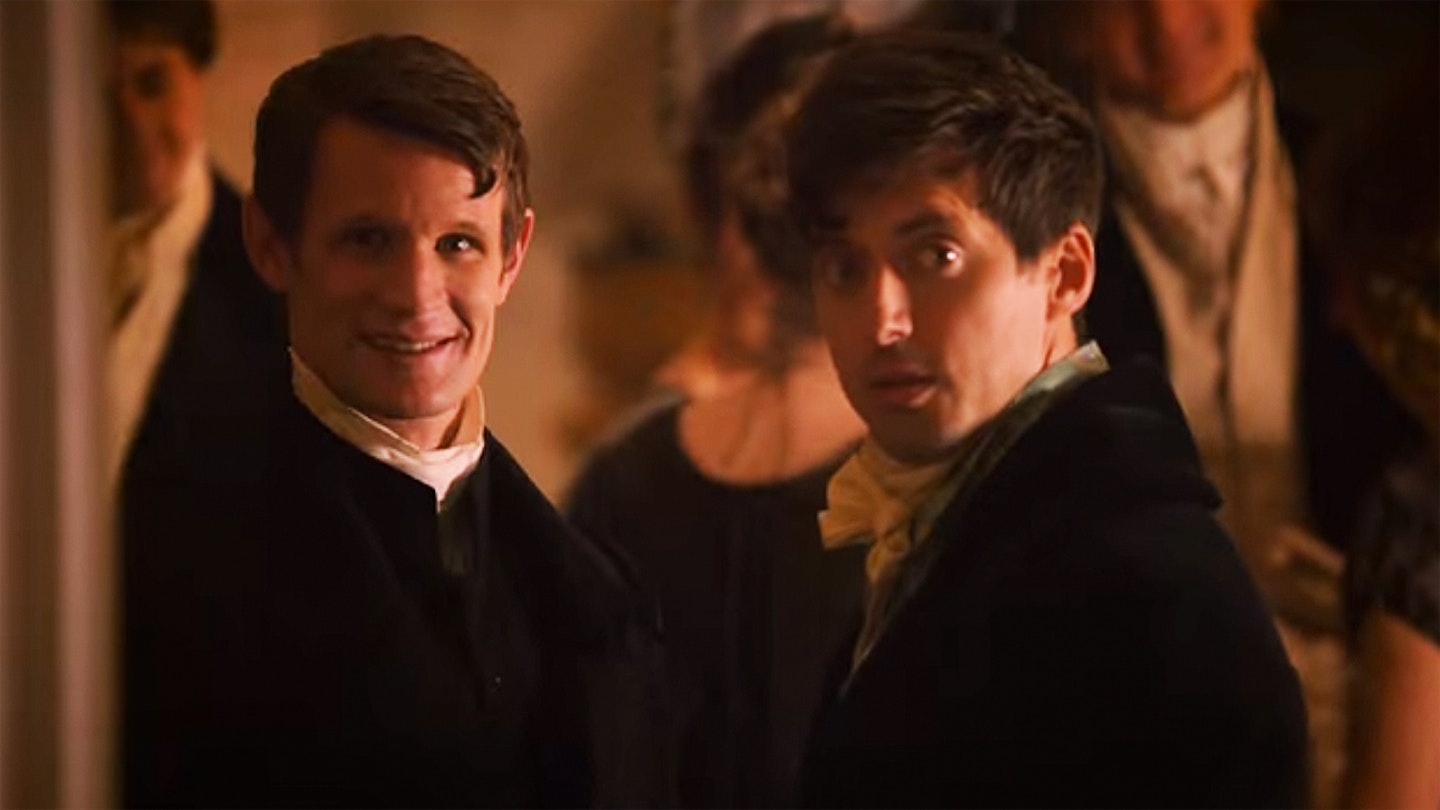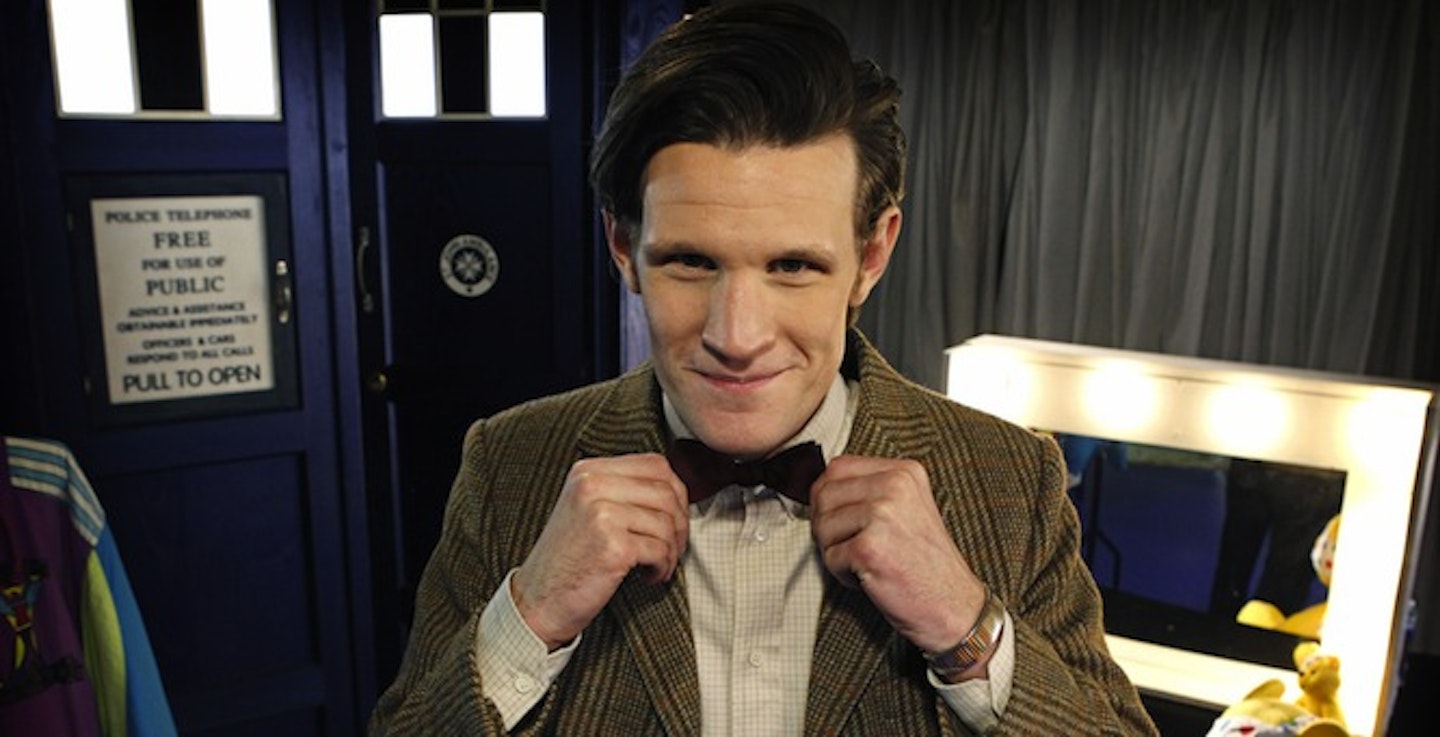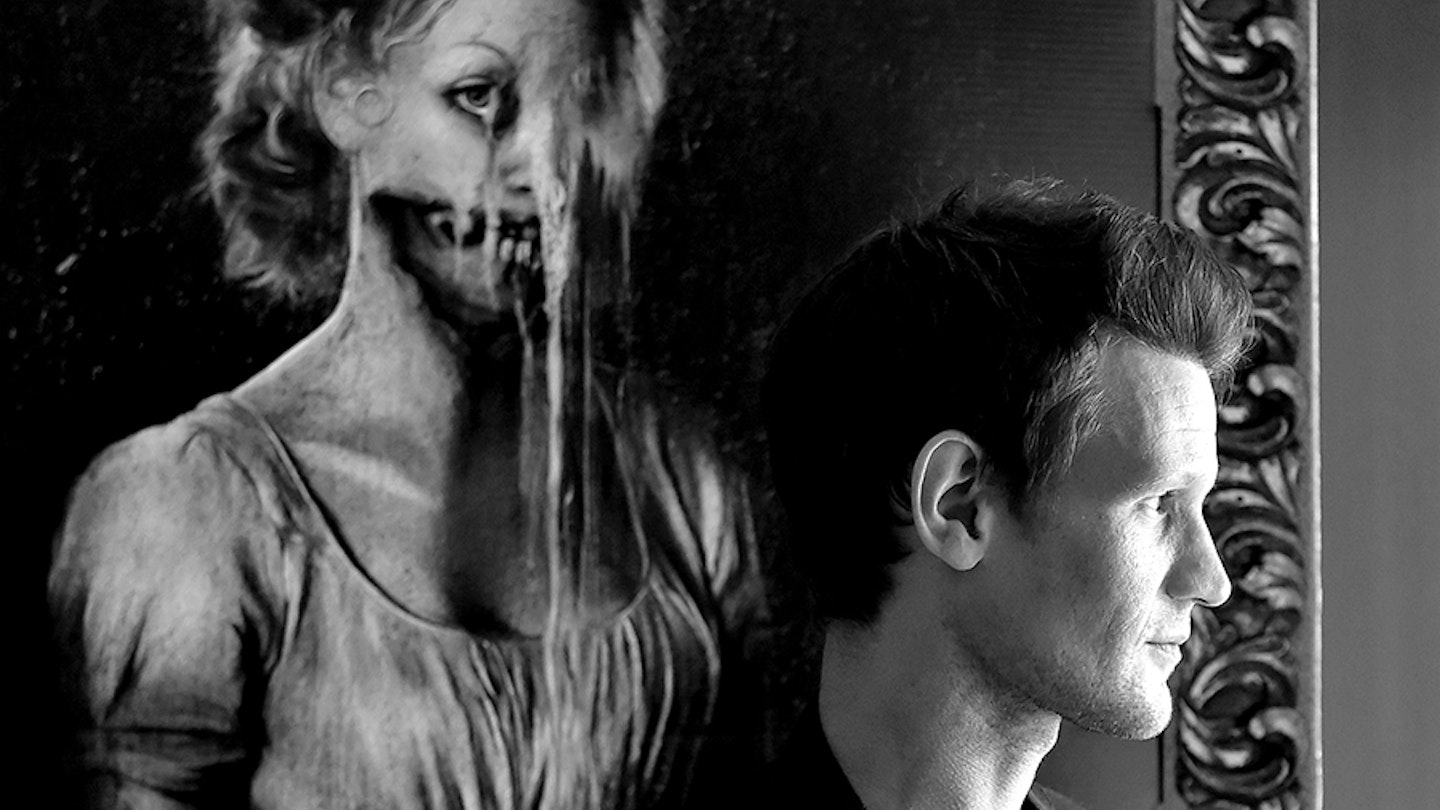There aren't many actors who can embody Skynet in Terminator Genisys one minute and make the word "Fuddles!" happen in Pride And Prejudice And Zombies the next, but Matt Smith, elastic in range and game for a challenge, is one of them. In person he's as playfully arch and sharp-witted as some of his characters. While guesting on the Empire Podcast, Smith chatted merrily about everything from hungover acting to his time as Doctor Who to that In Bruges deleted scene.

What was your reaction when you first heard the title?
I was like, (Surprised noise) “Oooooooo… okay, cool.” Then I read the script, then I found out loads of my friends were doing it, then I went for a beer with the director which turned into four and then I was doing the film.
Were you always lined up for Mr. Collins?
No, I mean it was completely random really. You get a call from your agent saying, “How about this?” and you say, “Okay, why not?” And then I had an idea for the part where I thought, “Wouldn’t it be cool if he was secretly in love with Mr. Darcy?” and here we are.
He’s not the coolest man in literary history.
No, it’s very rare that I play cool people. I’m not sure what that says about me but, yeah, damn.
It’s very rare that I play cool people. I’m not sure what that says about me.
So that secret crush on Darcy was your way into the movie?
Yes, it was. Because these things have been done and they’ve been done well before, and the fact that you’ve got zombies in this movie allows you to make slightly bolder choices tonally, so I wanted to put an interesting spin on this guy. Shamefully, I thought it was that.
Does this reflect a real-life admiration for Sam Riley?
Oh yeah. Every since I saw Control… everyone fell in love with Sam Riley then. See, Sam is cool. He’s actually cool.
Had you read this book or Pride & Prejudice.
God no, I hadn’t gone near them – or any Jane Austen – but actually it’s a real good book. They’re both really good books. Hopefully this film can draw people to Jane Austen, because if you’re 15 and particularly if you’re a bloke having Jane Austen wih zombies is more approachable than straight-up Jane Austen and girls talking about marriage and stuff. It’s never really appealed to me in that way. I found both books really useful as an actor – especially the original – because it’s full of little character bits you can use.

And Seth Grahame-Smith’s book lifts huge swathes of Austen.
Yeah, it does. That’s one of the challenges of a film like this, because you’ve got to balance the Pride-and-Prejudice-ness with the zombie-ness. Hopefully there’s enough of both for it to feel balanced.
What was it like on set? There were stories of the Bennet girls (Bella Heathcote, Suki Waterhouse and Lily James) forming a sort of gang. Were you outnumbered and/or bullied?
Yes, constantly. Bloody women clubbing together, being cool and sexy and ninja-like, and us men being pathetic on the sidelines. On set was a laugh actuallly, because we’re all relatively the same age – some of us were a bit older, me and Sam (Riley) and Jack (Huston) were the old men – but [it was a] great cast. And then people like Charles Dance and Sally Phillips and the girls, and young actors like Minnie Brady and Ellie Bamber, who are really up-and-coming, so there was a nice balance and a good energy. And then we had a laugh outside of work, which is what it’s all about, isn’t it? I threw a Halloween party which was a riot.
What did you dress up as?
Oh, I don’t know. Just a pillock really. It was the Saturday before the Monday when we shot the ball and I was really hungover, even though it was three days later. That’s the sign of a good party.
On a different topic, we had the news of Steven Moffat leaving Doctor Who last week. Did he call you up and tell you?
Yes, he did actually. Well, he texted me saying they were going to send out the press release the next day. For me, that’s the last of my era. I just think he’s done a fantastic job. He did a wonderful job in reinventing it because it was so brilliant before, and he had to put his own spin on it and he did that, and he’s told some great stories. He’s seen two Doctors out, he’s seen some great companions come through, he’s done brilliantly for River Song and Strax. [He’s] created some great monsters as well, when you look at the Silence and Weeping Angels. He’s left his legacy and his mark on Doctor Who, which is not easy to do well. I’m proud of him and I’m proud that I was one of his Doctors.
How is it now you’ve got a bit of distance from it?
It’s interesting. It’s quite a hard show to leave because you could make Doctor Who forever and be happy, so it’s a bit of a wrench, but it’s nice. Pastures new and all that. You just become a bit of a fun. And it never really leaves you. The majority of things that people say to me are “Doctor”. It’s nothing else that I’ve done, it’s just Doctor Who generally. Steven said to me, “That’s it for the rest of your life,” and hopefully for a whole generation of five to 15-year-olds I’ll be their Doctor when they’re 50. That’s the charm of it, I suppose.
When I started Doctor Who Steven Moffat said, “That’s it for the rest of your life.” I’ll be Doctor to a whole generation when they’re 50.
It was while you were there that Doctor Who broke out in the US. Is that fair?
That’s one of the things I’m really proud of, and one of the things that particularly me and Karen (Gillan) and Arthur (Darvill) worked really hard at was pushing the show over there, and BBC America backed it actually. It seems odd that it wasn’t pushed there in the same way before, because they have such a culture of science-fiction – they love it and they soak it up, and actually a show like Doctor Who that has that legacy and that type of storytelling [fits in with that]. It still always felt quintessentially British; it’s our show, it’s the blue police box and it will ever be thus. It was interesting thing to witness or be a part of something that feels like a genesis.
Did you succeed in making bow ties cool?
Yeah, at least to me. It’s Steven Moffat, although the bow tie was me. I had the tweed blazer on and I just felt that something was missing, so I said, “Can I try a bow tie on?” And Steven and Piers (Wenger) and Beth (Willis), the producers at the time, were like, “Not a bow tie. It’s going to make you look old and rubbish.” But I asked if I could just try it on and it was one of those moments where they went, “Oooooh…” and then Steven came up with that line, “Bow ties are cool”, and I kept saying it. I kept asking if I could have a hat and he gave me a fez which he thought I wouldn’t like. But I actually loved the fez, so he kept blowing it up. You bastard, Steven.

How important was it to do something different straight afterwards, because you went on to do American Psycho as a stage musical?
I didn’t have any great strategic plan. As an actor, you’ll have ten parts in 2015 – eight of them will go to the other actors above you and two of them you might be close to, and you try to make them as good as you can. But I’d always wanted to try a musical, I’d always loved that book, I’d always loved that character so it felt like a good risk.
It’s a big challenge.
It struck the fear of God into me, I can’t tell you. It was a total panic. In my romanticised version of the kind of actor I want to be, people will go “Oh, he’s doing that. Oh, he’s doing that.” He’s gone from funny to serious and hopefully you can’t see the chinks. I like not being defined as one thing.
Did it give you a taste for playing bad guys?
Yes, I like playing bad guys. It sounds really wanky but I like getting into that psychology. It’s fun. I mean, I did some really weird shit as Patrick Bateman. You can push your mind into really odd places. That was the great thing about being the Doctor: when you’re starting out you’re trying to get into character, so I’d run a bath in character as the Doctor and it was an interesting experience.
I like playing bad guys. It sounds really wanky but I like getting into that psychology. I did some really weird shit as Patrick Bateman.
How does the Doctor run a bath?
Not like we’d run a bath, let me tell you.
You don’t use social media?
No, I’d rather chop my own arms off. There’s a guy on Instagram who has 80,000 people following him and it winds my mum up everyday. He’ll post a picture of me and my mum and caption it. Don’t believe it, guys.
Turning to Terminator Genisys, which you were only in for a very short time. Did you film more scenes that wasn’t used?
No, that was it. Those were my two scenes.
Was the plan to come back further down the line?
Yeah, I think so. Look, I don’t know what the plan was in any great detail - I’m sure they had a plan - but needless to say it’s not turned out and evolved in quite the way everyone thought it might, but so I’m doing other things instead.
Including Robert Mapplethorpe, the photographer. Is that right?
Yes, perhaps. I’m finishing playing Prince Philip at the moment for (Peter Morgan’s Netflix show) The Crown, which has been good fun, and then maybe playing Mapplethorpe which could be good fun. I didn’t know too much about it, but I love New York and I love that period so I thought that could be an interesting challenge.
He was an art photographer, is that right?
Yeah, I guess so. There’s a book called Just Kids about him and Patti Smith, which is really interesting, and he came up in that time and took photographs in New York. The cover of (Patti Smith’s 1975 album) Horses, where she’s got the jacket over her shoulder, was a Mapplethorpe photograph, and he also photographed a lot of naked men and phallic orchids. He pushed the boundaries of sex and image and rock ‘n’ roll, and hopefully this film will explore that.
And in The Crown you’re playing the Duke of Edinburgh?
Prince Philip, yeah… who I love now. I didn’t know much about him but he’s a really interesting man. He’s a fascinating life. Total maverick and the constant voice of dissidence and the unreasonable one in the royal household.
You’re in a deleted scene in In Bruges as a young Harry…
I am indeed, as a young Ralph Fiennes. It was a great scene. I got to go in and chop this guy’s head off in a police station but it never made it in because Ralph Fiennes was so brilliant, you just don’t need anything else. [The scene] was about how mad Harry was but actually you don’t need that because he’s totally mad already. I love Ralph Fiennes.
What’s next for you?
A break and then hopefully a play. There’s a great part in a play that’s been done before – I don’t want to say which one in case it doesn’t work out – but that’d be cool.
Pride And Prejudice And Zombies is out now. [Check out Empire's review here](http://www.empireonline.com/movies/pride-prejudice-zombies/review/
) or listen to the full podcast interview with Smith at around the 14 minute mark here.
Portraits courtesy of Getty Images
